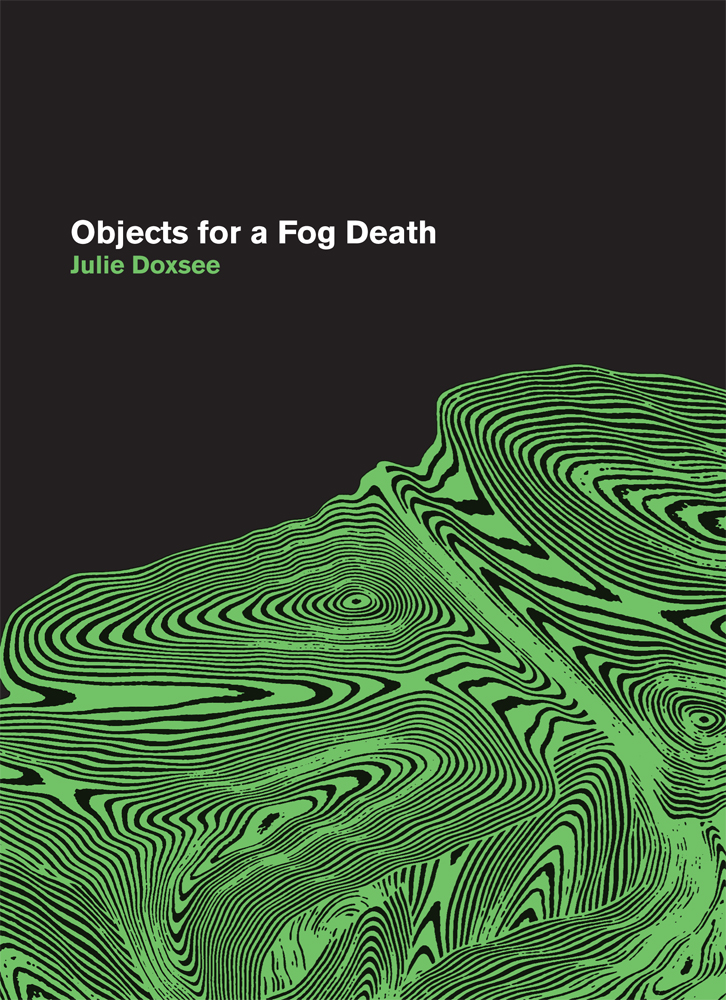

Reviewed May 18, 2012 by Nick Sturm.
Entering a fog is a disturbing, exhilarating experience. To be surrounded by a single, diffuse body of vapor, this weightless substance that seems to actively transgress the border between material and nonmaterial, to be at once touched by it and confounded by it, is to exist, at least for a moment, in a kind of dream-like fold where the senses are in disorder, where every movement is a charged, intuitive reaction, where sound, with its ability to reveal distance, is the only reliable form of communication. Entering Julie Doxsee’s Objects For a Fog Death is all of these things; so when you find the deer in the treetop, don’t be surprised. But you will be surprised, and a little terrified. Indeed, in “X,” “we graduate gradually / to knives,” and representation, an activity these poems elegantly avoid, becomes problematic.
The symbolic is not to be trusted. Belief in objects, real or unreal, and in the music those objects make, is what holds sway in the turbulent mind of this book. But trying to hold onto anything for too long is not the goal of these poems. Any attempt to assign order will prove just as futile as trying to allocate a definitive meaning to any one of Doxsee’s poems. Each poem is a “strange / piece of nighttime” (from “Magnets, Please”); a “slipperiness decorated by // bombs & touches” (from “Metal Tour”); a pack of “dreams accordioning from / objects” (from “Poem”). Doxsee’s poems are populated with recurring objects and images, some archetypal, such as fire, lightning, angels, snow, water, and others, which are pieces of an opaque, interior world, including balloons, scissors, maps, magnets, sphinxes, and fingerprints. As these words, and their worlds, reappear, collapse, and amalgamate, Objects For a Fog Death begins to cohere. But just as quickly, the resonance of its echoes drifts back into the gorgeous, conceptual thickness. Dimensional characteristics dissolve. The stability between states of matter becomes irrelevant. We are successfully entranced. In its entirety, “I Pretend Your Hands”:
One cannot help but be quietly, delicately overwhelmed and, at last, astounded. The voice is both vulnerable and authoritative, lulling us and never letting go. There is a syntactic and semantic complexity in these poems that makes Doxsee’s work both a pleasure and a challenge. But like all good “difficult” writing, these poems teach you how to read them. Allow the sonic textures of these lyrics to wash over you, sift through the emotional weight/weightlessness of the language, align the intellectual sharpness of Doxsee’s syntax with the clean, illuminated form of the book as a whole, and see where you end up. If that doesn’t work, consider using sonar and flowers. From “Offering”:
That Doxsee’s poems are able to simultaneously resist the order of the senses and achieve a crystalline-like order on the page is one of the major accomplishments of this book. Nearly all of these poems are written in packed, terse couplets where each line is taut as a wire. Yet, Doxsee’s line and stanza breaks maximize the tension and energy of her language, urging us into her music, pushing us over an edge we didn’t even know was there. It is in this way that each poem embodies the contradictions contained in the book’s title. Each word is an object to be found and manipulated from out of the fog of speech and emotion, and arranged, darkly, delicately, into machines made of music. Doxsee writes, “I’m holding / what’s left of my tongue” (from “To the Less Accurate Rippling of Tunes”), and she has taken those pieces and made a bouquet. That the bouquet is on fire is for us to deal with.*
*This review first appeared in Whiskey Island.
***
Nick Sturm is the author of the chapbook WHAT A TREMENDOUS TIME WE'RE HAVING! (iO Books, 2012), and his work has appeared in Aesthetix, Bookslut, Coldfront, HTMLGIANT, Typo, and elsewhere.